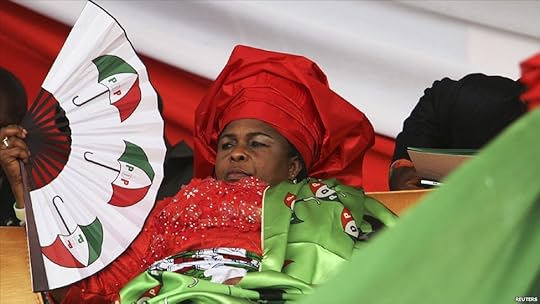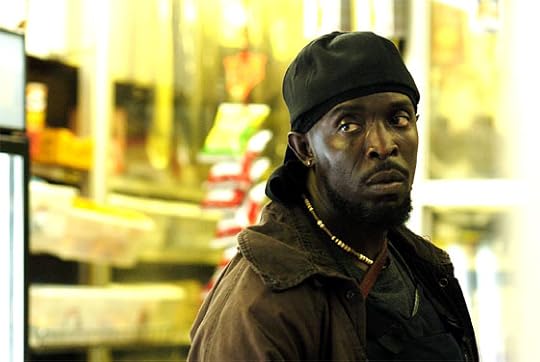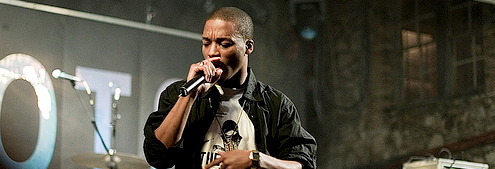Sean Jacobs's Blog, page 669
March 14, 2011
'Vote for Umblerra'
Probably to deal with the stresses associated with next month general elections scheduled for next month–there's a real threat of terrorist violence and vote rigging is widespread–Nigerians (online especially) are having too much fun at the expense of First Lady, Patience Jonathan, who has a history of mangling her words. An audio recording has emerged of Mrs Jonathan speaking at a rally of the ruling party. She was "trying to persuade her listeners to vote for the 'Umbrella', the unmistakable symbol of the Peoples' Democratic Party. However, she er… well she might have inadvertently done just the opposite."








March 13, 2011
Exodus
A humanitarian crisis has many faces. In Tunisia now, fleeing immigrants have overrun the border crossing of Ras Ajdir in an attempt to escape the strife in Libya. The travelers are mostly male Egyptian laborers but also migrant workers from Tunisia, Bangladesh, China. They arrive in overcrowded cars and buses and on foot, dragging suitcases.
Series of images by photographer Paulo Pellegrin in today's in The New York Times Magazine.








Wally Badarou
Some old skool flavor for the weekend. The 1986 video for "Chief Inspector" by the Paris-born, Beninois musician Wally Badarou, more famous for his collaborations with Grace Jones ( examples, Private Life and "Use Me", while he was at Island Records in Jamaica. He also worked as producer, arranger or musician with, among others, Miriam Makeba, Angelique Kidjo, Youssou N'Dour, Gregory Isaacs ("Night Nurse"), Carlinhos Brown, and Salif Keita ("Africa," "Tekere"), etcetera.








March 12, 2011
Music Break
The video for Dutch singer Ntjam Rosie's song "In Need" featured in the latest episode of online series, What's Up Africa!








'The Black Image In An Era Of Globalization'
My department at The New School is co-hosting a two-day conference on "Re-Mixed and Re-Mastered: Defining and Distributing the Black Image in the Era of Globalization." I am also a discussant on one of the panels:
From Friday, April 8 through Sunday, April 10, this three-day conference examines the largely overlooked impact that different modes of distribution have on content creation and format of works by and for the African American community. The failures of top-down distribution models and the advent of multi-directional communication continue to alter the evolving landscape of available content and its mediums. Central to the conference is the question of how to continue to create and distribute content that challenges the dominant narrative but that maintains its cultural relevancy.
The Re-Mixed and Re-Mastered (R2) conference brings media makers, industry professionals, students and scholars of media, and film enthusiasts into a dialogue on increasing and diversifying the global distribution opportunities for media makers of color. This conference is intended to foster and strengthen a networked community committed to enhancing the visibility of high quality, independently produced media from around the world. The weekend will include screenings, panels, and workshops with media makers, cultural critics, and scholars from across the globe, as well as major industry decision makers and artists whose work speaks to issues both inside and outside the mainstream. We will present screenings of recently completed works and works-in-progress across formats, case studies, and DIY distribution techniques, including both firsthand information and alternative representations.
Confirmed guest panelists include: Jill Nelson (U.S.), renowned author and former Washington Post journalist; Frances Anne Solomon (Trinidad/Canada) of Caribbean Tales Worldwide Distribution; Ava DuVernay (U.S.), director/filmmaker, I Will Follow; Tambay Obenson (Nigeria/U.S.) of Shadow and Act: On Cinema of the African Diaspora; and Hlonipha Mokoena (South Africa/U.S.), assistant professor of anthropology at Columbia University, among others.
Featured New School faculty members include Sean Jacobs, Michelle Materre, Fabio Parasecoli, Rafael Parra and Tracyann Williams; participants also include New School alumni working in media, including Jennifer Carr MacArthur and Rucyl Mills.
Location: Theresa Lang Community and Student Center, The New School, Arnhold Hall, 55 West 13th Street, 2nd floor, New York City.







There shall be satire for all
Recently Al Jazeera English's media review show, Listening Post, did a breathless profile of South African cartoonist Zapiro and his satirical TV show, ZANEWS. The insert focused on Zapiro's outsize influence. The country's president, Jacob Zuma, is suing Zapiro for libel for how he is portrayed in one of Zapiror's cartoons. But it now appears Zapiro's reputation can't even save the show. The producers have had to halt production on the fourth season of ZANEWS because sponsors aren't coming forward. See here for a report.
I found it interesting for what it might say about viewers, advertisers and satire/free speech in South Africa.
We suspect the reasons why authorities at the country's "public broadcaster," the SABC won't be airing the series soon. Many critics accuse the SABC of not carrying any material that are critical of the current government. According to media reports the SABC also wanted editorial control, but the producers resisted. But neither ETV, the only private terresterial broadcaster, as well as the cable/satellite provider M-Net/Multichoice–neither very close to the ANC government–wants to broadcast the series. They both rejected it. Instead the show's episodes are posted on Youtube channel and on a mobi site, zanews.co.za.
In contrast to the SABC, it is more difficult to explain the motives of M-Net and ETV or that of advertisers. Does this mean that South African audiences, political representatives and its business are united in their unreadiness for sharp, popular satire unless the satirist wears a dress? Does ZANEWS cut too close to the bone? Or could it be that ZANEWS's puppets are not that funny? Talk to me.
Anyway, it would be a pity if it would go under. (Already the sometimes funny South African online satirical site, Hayibo, folded last year.) I stand under correction, but I know of only other TV show like ZANEWS on the continent of its type: the Kenyan show, The XYZ Show. (There's also the hilarious puppet-less "Bulls-Eye" on NTV Kenya which is funny even if you know little of the local context. Bulls-Eye, however, is like a long editorial with moving images)








Google Mandela
Backed by global-search-giant Google Inc., the foundation of aging South African leader Nelson Mandela is putting thousands of documents on the Internet, from a 1977 letter smuggled out of prison to his membership cards in the Methodist Church.
Google said Tuesday that it was providing a $1.25 million grant to the Nelson Mandela Center of Memory, part of the Nelson Mandela Foundation, to help preserve a trove of photographs, letters, calendars and journals through digital technology.
The $1.25 million grant is seen as a possible stepping stone to a broader relationship with Mr. Mandela's foundation, which is now disseminating digital bursts of his memorabilia through its website (www.nelsonmandela.org). Google is already helping the website with indexing, but it would also like to provide the search technology that will allow people around the world to troll through the life of the anti-apartheid icon.
"Google wants to help bring the world's historical heritage online, and the Internet offers new ways to preserve and share this information," said Luke Mckend, Google's South Africa country manager.
Mr. Mandela's foundation is expected to decide in coming weeks whether to use Google's search technology, say executives for the company and the foundation. The decision hinges largely on accessibility and affordability for users, said Sello Hatang, the foundation's spokesman. A key consideration, he added, is whether Google technology will allow a poor person in rural South Africa to tap into Mr. Mandela's archives with a mobile phone.
* You know what the calculations, by Mandela, are about, right?








March 11, 2011
The History of 'South African' Cinema
The Johannesburg filmmaker Cedric Sundstrom is been working on a documentary film on the history of cinema in South Africa. The Johannesburg-based movie review show "The Admiral and Akin" has put the trailer of Sundstrom's film online. (That's it above.) They also interviewed him on the show. You can only see the the episode trailer on Youtube.*
Anyway, it would be interesting to see the Sundstrom's finished film. Here's a link to an earlier three-part print interview with Sundstrom by the Gauteng Film Board about the broad outlines of that film history. We notice that its earlier roots largely one mimicking American and British cinema (segregated, Westerns, etcetera), focused exclusively on the lives of whites–"Boers and Brits"–in the first half of the 20th century, that Afrikaner cinema (heavily state-subsidized dominated after World War II), the emergence of anti-apartheid films along ethnic comedies and slapstick, and finally the turn to Hollywood after Apartheid. The trailer also suggests Sundstrom's definition of what constitutes South African film, is quite broad (some would say inclusive). I noticed the Canadian-produced "District 9″–the director is South African–in the trailer. Film buffs may spot clips from films like Zonk, Cry the Beloved Country, Dingaka, There's a Zulu on My Stoep, Voortrekkers, Tsotsi, Jerusalema, etcetera. I, for one, am looking forward to the completion of Sundstrom's film. The only other attempt at chronicling South Africa's fraught film "industry" on camera is Peter Davis' 2-part documentary "In Darkest Hollywood," which came out in 1994 and deserves a wider audience.
* On a sidenote, I have suggested the Admiral and Akin put the episodes online as once they're screen on African satellite TV channel, Mzantsi Magic. Especially since the show seems to be the only place where hard questions about that country's film "industry" are asked. For example, recently director Zola Maseko's told them: "South Africa's film industry remains the last bastion of white supremacy."








Music Break
The video for Gil Scott Heron and Jamie X's "I'll Take Care of U," from the album 'We're New Here.' The video posted on Youtube on International Women's Day, "tells the story of Nisa Rodriguez, a 19-year old boxer
and single mother from the Bronx, New York, as she works for a spot on
America's 2012 Olympic Boxing Team."








Lupe Fiasco Knows Black Presidents
The Chicago rapper, Lupe Fiasco, who gained some midlevel fame with his "Kick Push" song and generally has decent cultural politics, strangely brings up Zimbabwe's Robert Mugabe an interview this week:
I love Obama, and I love the fact that it's a black president of the United States of America, but he's not the first Black president," Fiasco told Gigwise.com. "Robert Mugabe is a black president too so let's not get to talking about precedents being set. The fact that he's Black and American, that's different. But that it's anything special beyond that, that just because of that everything's going to be a utopia, then that's not true … Fiasco was asked about Obama specifically because of a line in "Words I Never Said" from his just release third album Lasers. Fiasco raps, "Limbaugh was a racist, Glen Beck is a racist, Gaza Strip was getting bombed but Obama didn't say shit/That's why I didn't vote for him, next one either…"
What's Mugabe got to do with it? Does he take lessons about African politics from Akon?








Sean Jacobs's Blog
- Sean Jacobs's profile
- 4 followers








